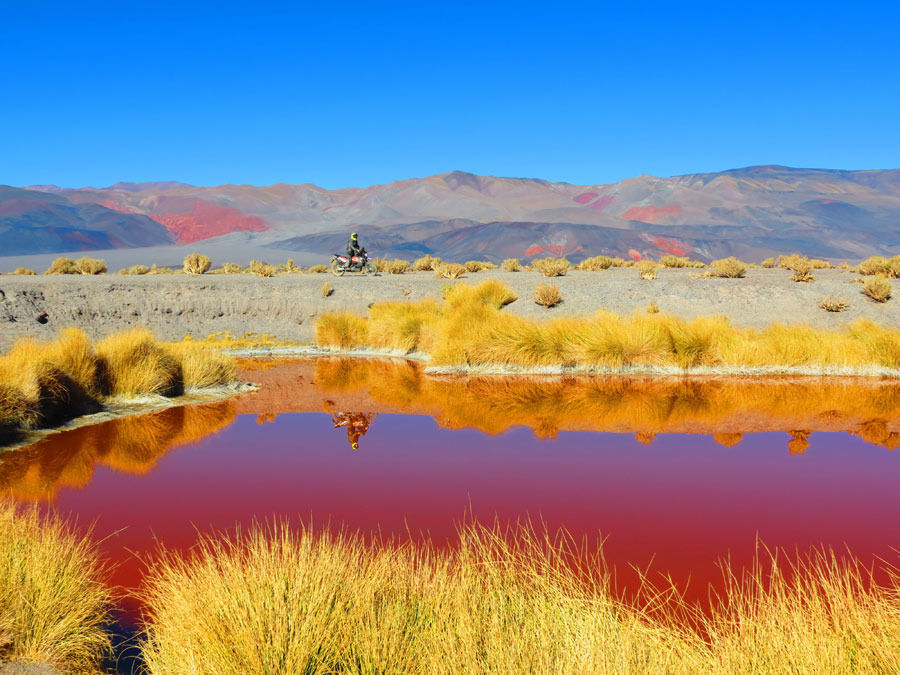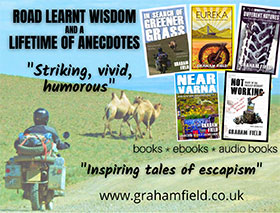Hey there,
I hope this is the right forum as it's not a proper ride tale. For 18 months now I'm on the road. From Malaysia I rode back to Germany with a Suzuki V-Strom (sponsored by Suzuki). Once I had reached my home town I just stayed long enough to get another bike and to buy different gear. Now I'm riding a Yamaha XT125 around Africa planning to circumnavigate it within two years or so.
Usually I try to ride the less travelled roads so I decided to ride from Cameroon directly to the Republic of Congo and to attempt the infamous Kinshasa-Lubumbashi crossing. As I'm extremely lazy, I'll only give the most necessary information here. If you have any further questions or would like to see photos (with descriptions in English), feel free to check out my facebook profile:
www.facebook.com/stevenslittleride
I'm more than happy to answer any of your questions, give advice or just share stories. Just message me
 1) Cameroon - Republic of Congo
1) Cameroon - Republic of Congo
It was quite hard to find any recent information on this road apart from "muddy, difficult, crazy" which is said about way too many roads in Africa in my opinion. I did it in late April, just at the end or dry season / beginning of the rainy season. The night before I started it was raining for nine hours straight so this information may be valid for the rainy season as well.
The best piece of advice probably is this one: Don't ride after a massive rain the night before :P
Road condition
Until Sangmelina it's tarmac. Stergios, a Greek friend of mine, did the same road two weeks earlier on his 200cc Vespa. He told me that the road is doable all the way to the border. For me - due to the heavy rain - the part from Sangmelina to Djoum was incredibly difficult. The road is mainly frequented by heavy trucks carrying trees from Congo to Cameroon. Those trucks have created deep, muddy tracks all the way which are a real challenge. I dropped my bike three times within 30 minutes.
The first 30 km or so after Djoum ar tarmac and after that it's an excellent piste for about 80 km. Pretty much all the way to the border the road is in a very good condition. No traffic, no tracks, not too much mud. Beautiful landscape and kind people.
After the border it's a little tricky. To Souanké it's not too difficult. The road to Sembe and especially the first 30-40 km after Sembe are a real challenge, though. Chinese are constructing a road there so it's very very muddy. Luckily it didn't rain the day before I got there so I could manage but Stergios destroyed his clutch on that bit. In a year or two it might be paved, though.
40 km past Sembe tarmac starts that lasts all the way down to Brazza. Only 100 km or so are not sealed but even those parts are in good condition.
2) Where did we cross the DRC border?
When we were in Brazza (beginning of May 2014) thousands of DRC citizens were expelled from the town causing the port and ferry to be a complete mess. Therefore we decided to take a little detour. We = Stergios (Vespa), Francis (BMW F 800 GS), Gee & Thimba (Land Rover) and me + Katarina (normally bycycle) on my XT 125. We rode to Kinkala where we turned left to Boko. All this is tarmac. In Boko a piste is leading West to Manianga and Luozi. It's quite bumpy but not too difficult. Immigration and customs were easy on both sides. In DRC nobody checked our Togolese residence papers. So this might be an option if you're a bit afraid of being returned by DRC immigrations.
In Luozi we took the ferry (all big ferries in DRC are for free normally) and continued down to Kimpese where tarmac starts.
3) Kinshasa - Lubumbashi
There are loads of horror stories out there about Kinshasa - Lubumbashi. Most of them are not true. Here are just a few of them (930 Franc = 1 USD):
The road is horrendous
Somewhat true. Kinshasa to Kikwit is paved. From Kikwit you have two options. You can either go through Tshikapa or through Illebo.
Tshikapa: It's about 180km shorter but the road is worse. Loads of sand and at times mud. There are more trucks, though. If you're not convinced that you can do it, maybe take this route.
Illebo: Sand, but not as much as in Tshikapa. Hardly any trucks. 180 km longer. Two ferry crossings and one destroyed bridge. Small bikes can cross over in a piroge, big bikes have to be pushed across. You'll take great pictures

We went through Illebo. We = Stergios (Vespa), Francis (BMW F 800 GS) and me (XT125). The first 60 km after Illebo are pretty bad. Loads of sand, deep tracks, steep hills. We had to push Stergios's Vespa all the time but for me and Francis it was quite ok. The remaining km to Illebo are ok. The first 50-60 km after Illebo are pretty bad again. Similar to the part after Kikwit. Loads of deep, soft sand, deep tracks and mud sometimes. Not much fun. Francis killed his clutch here and had to take a truck back to Kinshasa. From there it's quite ok just until 10 km out of Kakenge. Here Stergios killed his clutch and took a truck to Lubumbashi. So I had to do the remaining 1.600 km alone.
The first 80 km after Kakenge are pretty sandy again, but then it gets much better down to Kananga. Kananga - Mbuji-Mayi is shit. The first 30 km are tarmac but then it's deep sand again. Mbuji-Mayi to Mwene-Ditu is tarmac and from there it's a good piste all the way to Kabondo (between Kamina and Bukama). They are working on the road a lot and must have improved it considerably over the last 2-3 years. From Kabondo to Bukama (about 50km) it's a pain in the ass. Sand, powder and rocks. Super annoying. In Bukama the sisters told me not to go through Lubudi but through Luena and Kolwezi. This road is said to be much better. It was ok. Some sand, some rocks but nothing dramatic. There's one more ferry crossing (for free). From Kolwezi to Lubumbashi it's tarmac.
You'll have to pay toll for the two Kasai provinces (I paid 2.000 in Kananga and 500 in Mbuji-Mayi). The road from Kolwezi to Lubum is free for bikes.
No petrol
You can easily find petrol in any village. Obviously not in huge quantities and always about 200-300 Francs more expensive than in the next town. Here are some petrol prices: Kinshasa 1400 (maybe cheaper... I forgot the Kinshasa price

), Kikwit 1500-1600, Illebo 2000, Kananga 2200, Mbuji-Mayi 2350 (at petrol stations) and 2500 on the road, Kanyama 2800 (

), Kamina 2300, Bukama 2500 and Kolwezi 1700. Mostly you can find petrol every 10-20 kilometers in a village. So do not worry about your range. Just buy petrol whenever you see it and you'll be fine.
No food and water
Also DRC citizens eat and drink from time to time. Therefore you can find food and water in any village. It won't be Western food and it won't be bottled water, but if you're ok with eating Fufu, local veggies and bush meat, you'll enjoy it. We (Stergios, Francis and me) always ate and drank in the villages and none of us got sick.
Crazy corruption & Tourist permit
Just like in any other (West) African country police and especially DGM (Congolese immigration 'service') are corrupt and will ask you for money. We refused to pay every single time and didn't have any problems at all. I was only asked once for a tourist permit and simply told the policemen that my visa is sufficient. No problem at all. Buy an insurance, though. It is quite expensive (50$ for two months) but I was asked about 10 times for it. This will save you lots of time and money in the long run.
Hostile locals
This is somewhat true. In villages people treated me incredibly friendly. I always felt safe and enjoyed the Congolese hospitality. In and between big cities (especially Kananga, Mbuji-Mayi, Mwene Ditu and Bukama) I was quite annoyed by the locals. Constantly people ask you for money, try to grab your shirt to stop you or shout at you. It was a little annoying. However, you can understand this when you see all the white NGO people there throwing their money around. It's a shame. Generally if you stay in villages or Catholic missions, you'll be fine.
Where to sleep?
In every small town there's a Catholic mission where you can pitch your tent for free. Mostly the priests are very friendly and will be happy to see tourists. Here are a few Garmin coordinates:
Idiofa - S04°58.558 - E019°34.598
Illebo - S04°19.902 - E020°34.488 (This is a pretty shitty but cheap hotel. 8$ per room. We decided to pitch our tents on the huge balcony.)
Domiongo - S04°36.213 - E021°13.395
Kananga - S05°51.989 - E022°23.218 (I might have messed up this point. Maybe the mission is a few hundred meters further up North. If you cannot find it, just ask people; they will know it.)
Mbuji-Mayi - S06°08.168 - E023°36.162 (I stayed in the house of a very kind priest. Very friendly people!)
Kanyama - S07°30.668 - E024°09.986
Bukama - S09°12.577 - E025°51.481 (There is a white priest in the main mission. He's a dick. I arrived there tired, dead exhausted and with an infected leg, just asking to pitch my tent and he simply kicked me out even though it was dark already. Opposite his mission is a sister's mission. They are extremely kind. Truly wonderful, warm-hearted people!)
Kolwezi - S10°43.665 - E025°29.123 (Amazing hospitality. They gave me a room and allowed me to stay for a week while I was repairing my bike. Mission Fatima)
I hope this helps to clear up some of the myths... If you have any questions, feel free to contact me via FB. I'll also check this thread from time to time but if you need a quick reply, FB might be better

Cheers,
Steven
 10Likes
10Likes
























 ), Kikwit 1500-1600, Illebo 2000, Kananga 2200, Mbuji-Mayi 2350 (at petrol stations) and 2500 on the road, Kanyama 2800 (
), Kikwit 1500-1600, Illebo 2000, Kananga 2200, Mbuji-Mayi 2350 (at petrol stations) and 2500 on the road, Kanyama 2800 ( ), Kamina 2300, Bukama 2500 and Kolwezi 1700. Mostly you can find petrol every 10-20 kilometers in a village. So do not worry about your range. Just buy petrol whenever you see it and you'll be fine.
), Kamina 2300, Bukama 2500 and Kolwezi 1700. Mostly you can find petrol every 10-20 kilometers in a village. So do not worry about your range. Just buy petrol whenever you see it and you'll be fine.








 Linear Mode
Linear Mode









